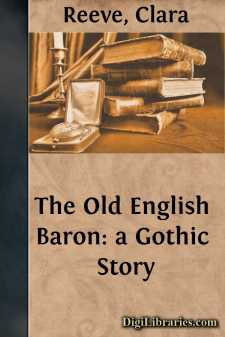Categories
- Antiques & Collectibles 13
- Architecture 36
- Art 48
- Bibles 22
- Biography & Autobiography 813
- Body, Mind & Spirit 142
- Business & Economics 28
- Children's Books 15
- Children's Fiction 12
- Computers 4
- Cooking 94
- Crafts & Hobbies 4
- Drama 346
- Education 46
- Family & Relationships 57
- Fiction 11828
- Games 19
- Gardening 17
- Health & Fitness 34
- History 1377
- House & Home 1
- Humor 147
- Juvenile Fiction 1873
- Juvenile Nonfiction 202
- Language Arts & Disciplines 88
- Law 16
- Literary Collections 686
- Literary Criticism 179
- Mathematics 13
- Medical 41
- Music 40
- Nature 179
- Non-Classifiable 1768
- Performing Arts 7
- Periodicals 1453
- Philosophy 64
- Photography 2
- Poetry 896
- Political Science 203
- Psychology 42
- Reference 154
- Religion 513
- Science 126
- Self-Help 84
- Social Science 81
- Sports & Recreation 34
- Study Aids 3
- Technology & Engineering 59
- Transportation 23
- Travel 463
- True Crime 29
The Old English Baron: a Gothic Story
by: Clara Reeve
Description:
Excerpt
PREFACE
As this Story is of a species which, though not new, is out of the common track, it has been thought necessary to point out some circumstances to the reader, which will elucidate the design, and, it is hoped, will induce him to form a favourable, as well as a right judgment of the work before him.
This Story is the literary offspring of The Castle of Otranto, written upon the same plan, with a design to unite the most attractive and interesting circumstances of the ancient Romance and modern Novel, at the same time it assumes a character and manner of its own, that differs from both; it is distinguished by the appellation of a Gothic Story, being a picture of Gothic times and manners. Fictitious stories have been the delight of all times and all countries, by oral tradition in barbarous, by writing in more civilized ones; and although some persons of wit and learning have condemned them indiscriminately, I would venture to affirm, that even those who so much affect to despise them under one form, will receive and embrace them under another.
Thus, for instance, a man shall admire and almost adore the Epic poems of the Ancients, and yet despise and execrate the ancient Romances, which are only Epics in prose.
History represents human nature as it is in real life, alas, too often a melancholy retrospect! Romance displays only the amiable side of the picture; it shews the pleasing features, and throws a veil over the blemishes: Mankind are naturally pleased with what gratifies their vanity; and vanity, like all other passions of the human heart, may be rendered subservient to good and useful purposes.
I confess that it may be abused, and become an instrument to corrupt the manners and morals of mankind; so may poetry, so may plays, so may every kind of composition; but that will prove nothing more than the old saying lately revived by the philosophers the most in fashion, "that every earthly thing has two handles."
The business of Romance is, first, to excite the attention; and secondly, to direct it to some useful, or at least innocent, end: Happy the writer who attains both these points, like Richardson! and not unfortunate, or undeserving praise, he who gains only the latter, and furnishes out an entertainment for the reader!
Having, in some degree, opened my design, I beg leave to conduct my reader back again, till he comes within view of The Castle of Otranto; a work which, as already has been observed, is an attempt to unite the various merits and graces of the ancient Romance and modern Novel. To attain this end, there is required a sufficient degree of the marvellous, to excite the attention; enough of the manners of real life, to give an air of probability to the work; and enough of the pathetic, to engage the heart in its behalf.
The book we have mentioned is excellent in the two last points, but has a redundancy in the first; the opening excites the attention very strongly; the conduct of the story is artful and judicious; the characters are admirably drawn and supported; the diction polished and elegant; yet, with all these brilliant advantages, it palls upon the mind (though it does not upon the ear); and the reason is obvious, the machinery is so violent, that it destroys the effect it is intended to excite....


